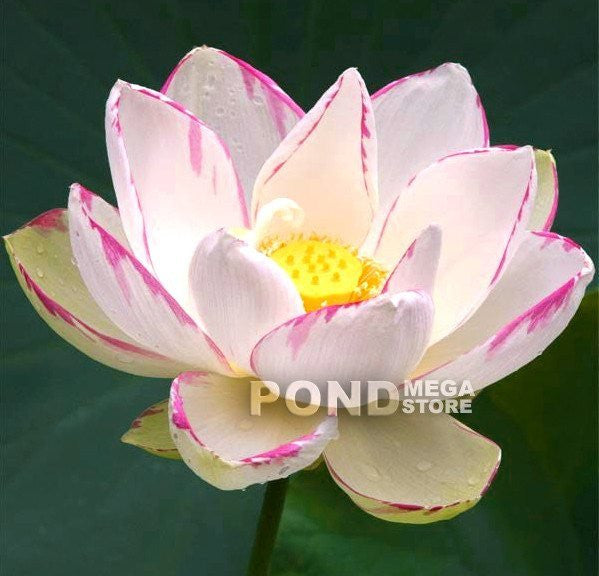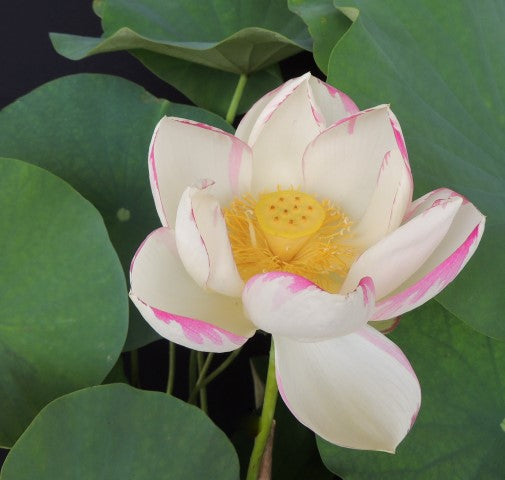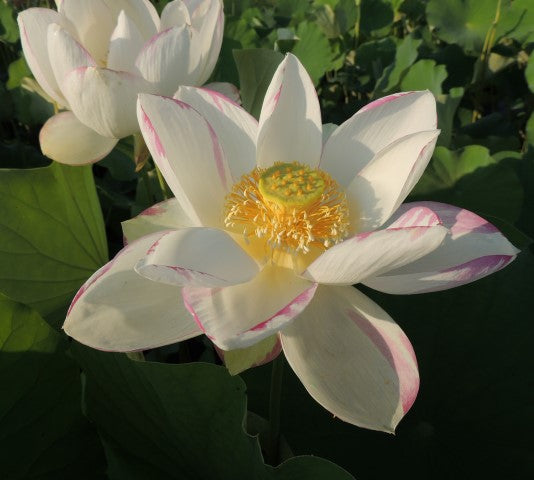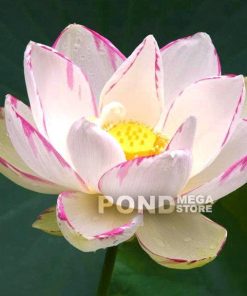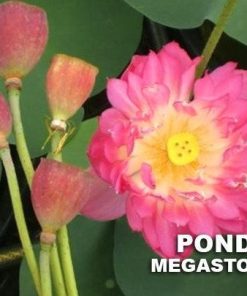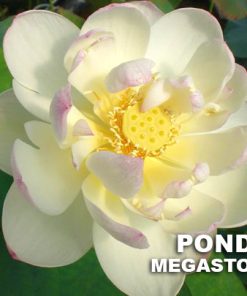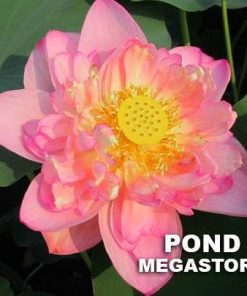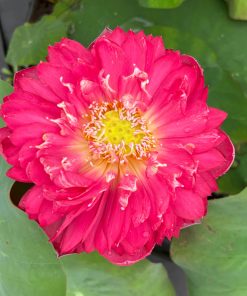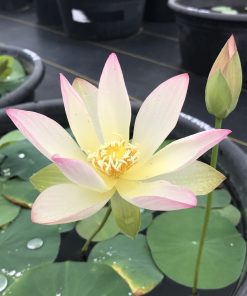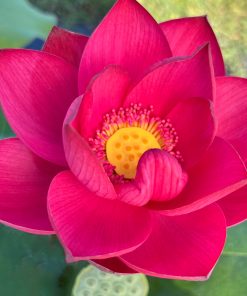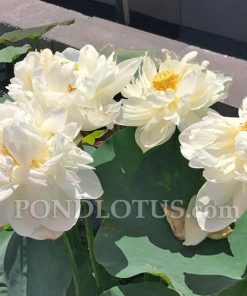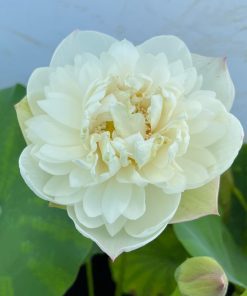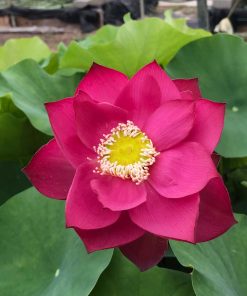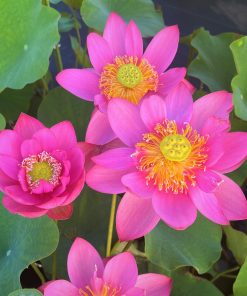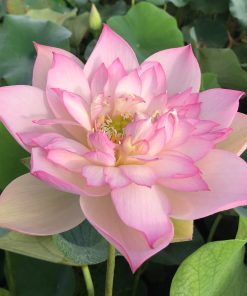Empress Lotus Ten Mile Creek Nursery
$ 55,00 $ 27,50
Plant description
Empress Lotus has purple markings on the bud as it emerges from the foliage, the regal, single-petal flowers are porcelain-white with purple markings over the edges, as if each petal were touched by the painter’s brush. The purple markings are unique and unusual, an extraordinary lotus that looks hand painted and fit for royalty! Bright-yellow receptacles and green foliage are perfect complements for this jewel of a lotus! ALWAYS A CUSTOMER FAVORITE!
Empress Lotus is an impressive addition to your pond or water feature. Empress Lotus may be planted in containers and placed on your balcony, terrace or patio. Empress Lotus looks striking as a focal point when planted in containers and placed in your pond. Empress Lotus grows to 4 feet tall or taller when grown in wide, shallow containers (containers should be 24 – 48 inches wide or wider)
A digital version of our
New Lotus Booklet now comes FREE with all Lotus Purchases!
Planting instructions
Plant in pond in a very large, wide, no holes container (24 – 48 inches in diameter in loam soil, in full sun, outdoors, with 6 – 8 inches of water over the tuber. Empress Lotus may also be grown in wide containers and placed in a sunny area (8 – 12 hours of sunlight) on your deck or patio. Fertilize monthly with fertilizer tabs once plant is established with two aerial leaves standing out of the water.
*We recommend Waterlily World Fertilizer Tabs + Humates for optimum growth and best bloom. Simply press fertilizer tabs into the soil near the roots of your lotus. Wait until your lotus has aerial leaves to begin fertilizing–first dose of fertilizer should be 1/2 the recommended dosage. Fertilize throughout the growing/blooming season, June through September. In many areas, Lotus bloom until October!
What Is Loam Soil?
Loam soil is a good mixture of Topsoil and Sand
If you are lucky enough to have good topsoil in your backyard, by all means, use your topsoil. All you will have to do is add fertilizer. If you are not so lucky–and your backyard is sand or heavy red or yellow clay, you can mix up a batch of loam soil.
You can create your own loam soil by mixing these two ingredients together
- 2/3 Inorganic Topsoil (Little or no organic material added)
- 1/3 Pool Filter Sand
Mix together thoroughly with a little water. Your soil should clump when squeezed. If your soil is mixed properly, it will not muddy your pond water.
You can purchase inexpensive bags of inexpensive / poor Topsoil at Lowes or Home-Depot. Good soil clumps together as a ball in your hand with only a little moisture.
Don’t buy brands like Scott’s or Miracle-Gro, as they will contain too much organic matter that can foul your water. Buy an unbranded bag of topsoil instead.
You can purchase Pool Filter Sand at any store that sells pool supplies.
Loam soil is well suited for all aquatic plants (except oxygenators). Oxygenators rarely need to be planted, just anchored in the substrate or in a container filled with sand or 1/8 inch pea gravel.
Sand holds little water but does allow for aeration and drainage.
Some DO’s and DON’TS regarding Aquatic Planting Soil
DO NOT use potting soils ( as they are too light and will float right out of the pot). Potting Soil has organic material that will rot and foul your water!
DO NOT add too much composted material (as it is too rich in organic matter and it will ferment underwater and destroy the ecology of your pond).
DO NOT use 100% calcined clay as there is no nutritional value in calcined clay.
DO NOT add rocks, stones or pebbles to the top of your planting container as this will inhibit the growth of your plants. Plants do not grow in rocks and stones in nature!
DO NOT purchase API Aquatic Planting Media or Microbe-lift Aquatic Planting Media as these products are NOT suitable for waterlilies, lotus or most other pond plants. They are suitable for submerged grasses ONLY!
Reviews
Speedy Delivery and Professional Packaging
We can offer a variety of shipping options due to our long-term relationship with UPS FedEx DHL. Our warehouse staff are highly trained and will pack the items according to our exact and precise specifications. Your products will be subjected to an extensive inspection and be securely packaged before being delivered. We ship to hundreds of thousands of customers daily across various countries. This is an indication of our determination to become the largest online retailer worldwide. Warehouses and distribution centres can be located in Europe as well as in the USA.
Orders with more than one item are assigned processing periods according to each item.
Prior to shipment, we examine the items ordered carefully before shipping. Most orders are shipped within 48 hours. It is expected that delivery will take between 3 and 7 days.
Returns
We do not manage the stock in our factory and warehouse. So the actual stock may change at any time. Please be aware that it's possible that your order will run out of stock even after you have made the order.
Our policy runs for a period of 30 days. If thirty days have passed from the date you purchased the item, we cannot provide a refund or exchange.
The item must not be used, and it must be in the original packaging. You must have the item in the original packaging.
